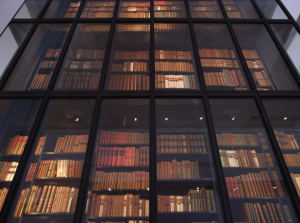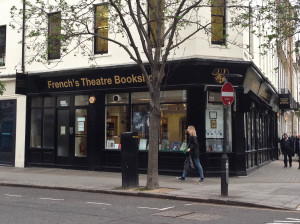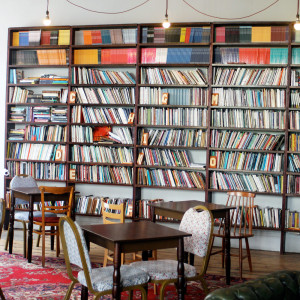You can’t be a good writer if you’re not a good reader. But buying scripts can get expensive, and staying in touch with the best new writing can become a serious drain on your bank balance. Thankfully, this city has a great many opportunities for the curious reader looking for some inspiration. Here are our top tips for ways to read more plays than you can handle, most of them for free:
1. The British Library.
A no-brainer. As a deposit library, the BL has access to copies of every book ever published in the UK, plays included. Just order the texts you want to read from their online catalogue, and a few hours later they’ll be waiting for you at the service desk.

You have to get a Reader’s Pass to use the Library, which is free, but requires you to justify why you need to use their resources. If you’re interested in researching a topic related to your job or studies, this will usually do. Getting a pass can seem a little daunting, but the staff are friendly and if you can get one it’s absolutely worth the effort.
You won’t be able to take books home, but with reading rooms as beautiful as this you won’t want to. Plus, it’s open late on weeknights, so you can go after work for some quality study time.
2. City of Westminster Reference Library
If you can’t get into the British Library, you might want to try this West End library as an alternative. They specialise in the performing arts, and the collection includes an extensive collection of classic play texts, as well as up-to-date copies of all the major contact directories for agents, theatres and production companies. Membership is free to anyone who lives in the UK. Plus, they have a Sherlock Holmes collection. It’s win-win.
3. The National Theatre Archive
Snuggled up to The Old Vic in Waterloo is the National Theatre Studio, where the UK’s largest theatre develops its new projects and meticulously archives its old ones. You’ll need to make an appointment to access the archive, but it’s free and open to anyone. As well as reading a production’s prompt script, you can peek at the margin annotations, browse the designers’ sketches, and sometimes even watch recordings of final performances. Well worth it if you want to study a particular play in depth.
4. Become a script reader
New writing theatres are desperate for people to help them churn through their stacks of unsolicited script submissions. Drop their literary department a line and ask if they’re looking for any readers. A lot of the scripts you’ll get won’t be much good, but some of them will – and you shouldn’t underestimate what you can learn from your peers’ work, both good and bad. This is a great way to expose yourself to the coal face of new writing, and keep an eye on contemporary trends. Plus, you’ll get first hand experience of how a literary department works, and possibly make some great contacts.
5. The Shakespeare Readers’ Society
Meeting once a month in the basement of an occult bookshop in Bloomsbury, the Shakespeare Readers’ Society celebrate the joy of reading the bard’s work out loud. Parts are doled out on a sign-up sheet, but whether you’re a lead part or a cameo, there’s nothing like getting your head back into the classics and hearing some of the best work ever written being read aloud. When it’s over, pop £3 into the room hire tin and retire to the pub across the road to discuss the play.
6. Reading Groups
If the classics aren’t your thing, you can always try one of London’s many other established play-reading groups. One of the best is the Actors & Writers’ Forum, who meet once a fortnight at Hammersmith’s Riverside Studios for rehearsed readings of new plays and a subsequent Q&A. It’ll cost you £5 on the door, or there’s a membership scheme for £10 a year, which also allows you to submit your own scripts for a possible reading. But if this doesn’t take your fancy, scour meetup.com for an alternative, or use it to start one in your own neighbourhood. If you like hearing work read aloud, this is a great way to see what some of your fellow writers are getting up to, and possibly make some new friends.
7. Bush Theatre Café
Curl up with a cappuccino and browse the Bush Theatre’s wall of play texts – it’s not a huge collection but in the comfy surrounds of the old Shepherd’s Bush Library it’s a great place to kill some time before catching the evening show.
8. BBC Writers’ Room Script Library
Download copies of some of the BBC’s best comedy and drama scripts absolutely free. Yes, it’s not theatre, but don’t be a snob – you can still learn an awful lot about structure, character and style from these top-notch scripts: especially their collection of radio plays.
9. Drama School Libraries
If you can’t find what you’re looking for at a public library, you might want to try London’s many drama schools, which stock a whopping number of modern and classic plays. Some require you to pay a fee, like RADA, and some won’t let the public in at all – but access is usually free to staff, students and alumni – and if you know someone with a card it’s well worth asking if they’ll borrow something for you.
10. Samuel French Bookshop

We’re not suggesting you spend all day here reading plays from cover to cover, but browsing a bookshop can be a great way to get the flavour of different writers’ work, to contrast a few different styles and make an informed purchase of a text you’ll want to read in more depth later. Samuel French has a more extensive collection of plays than almost any bookshop in London – but the National Theatre and Royal Court bookshops are also worth a punt.
What’s your favourite place to read plays in London? Recommend something for us in the comments and we’ll go and check it out.



I think more of the obvious bookshops would have been worth mentioning, not least because people think of those places first and might be heading to them anyway for other sorts of reading/book-buying. I’m thinking here of Foyle’s in Tottenham Court Road and Waterstone’s in Gower St. Also I think worth mentioning those places that positively encourage reading and browsing by providing chairs and tables and sometimes even coffee bars as well – certainly French’s provide the former while the Waterstone’s at Piccadilly does both.